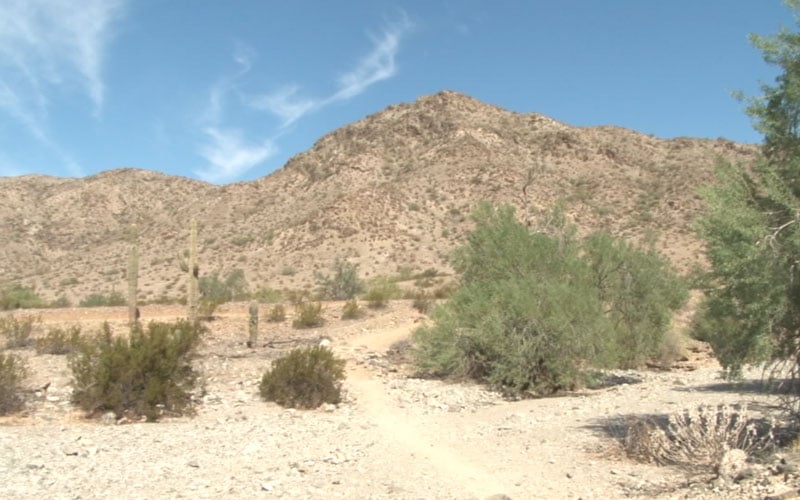
The planned South Mountain Freeway will cut through part of South Mountain Park, a sacred place for the Akimel O’odham Indian tribe who lives there. (Photo by Audrey Weil/Cronkite News)
As the future South Mountain Freeway breaks through the barriers of limited accessibility and traffic congestion, it creates a new obstacle by cutting through land that the Gila River Indian Community finds sacred.
ADOT is planning to construct the Loop 202 extension along the reservation’s border and through South Mountain Park, but the Akimel O’odham Indian tribe that occupies the Gila River area believes South Mountain is home to the deity Se’ehe, and any disruption to the land is more than just a physical intrusion.
“[Se’ehe] leads us through life and there are many stops and obstacles in our way,” indigenous rights activist Shannon Rivers said. “This freeway will be an obstacle for our people. Not only a physical obstacle but a spiritual obstacle.”
Even though the land is considered sacred, it falls under state jurisdiction because it is outside of the reservation. ADOT said the chosen route is the best alternative to avoid cutting through the reservation and only minimally cut through the park.
“We are having to cut through approximately 31 acres of the South Mountain Park. This is less than 0.2 percent of the whole park area so it’s a very small section of the park that will be affected by this highway,” ADOT spokesperson Dustin Krugel said.
The Gila River Indian Community is suing ADOT for building on sacred land and harming the environment. That lawsuit was combined with a suit filed by Protecting Arizona’s Resources and Children. A district judge refused to halt the project this summer and the trial is scheduled to be completed by March.
Arizona State University American Indian Studies Professor James Riding In is not optimistic about the outcome.
“This is part of a broader history where Indian people have seen their land sacrificed for the national good and the courts have generally refused indigenous freedom which makes it problematic in terms of trying to use the courts to seek justice and to protect sacred places and to ensure that they are not further harmed by development,” he said.
Riding In said it’s hard for non-Indians to grasp the concept of a sacred place, but that to the Akimel O’odham tribe, these mountains are living entities, not inanimate objects.
Rivers used a Christian analogy to explain: “They say that Moses went up on Mt. Sinai in the peninsula of Egypt and God was talking to him through a burning bush, and he gave him commandments. That sounds silly to me, but then if you think about the sacredness of this mountain to the people, and I’m not comparing the two. I’m using them as a reference to say the way you believe and the way we believe is just as important. My religious views and freedoms are just as important as yours.”
Rivers and Riding In contend that indigenous people are often the victims when natural land is destroyed for the sake of development.
“Most Indians believe in the concept of Mother Earth and the whole Earth is viewed as sacred in that way, but other places have profound religious significance like where the deities live and people pray. These are places that Indian nations want protected and that’s where the law falls short. They become vulnerable to desecration,” Riding In said.
Akimel O’odham youth leader Andrew Pedro is organizing a rally during ADOT’s pre-bid meeting next Tuesday to protest continued work on the freeway.
ADOT has already begun demolishing homes to make way for the freeway, and construction is set to begin next year.